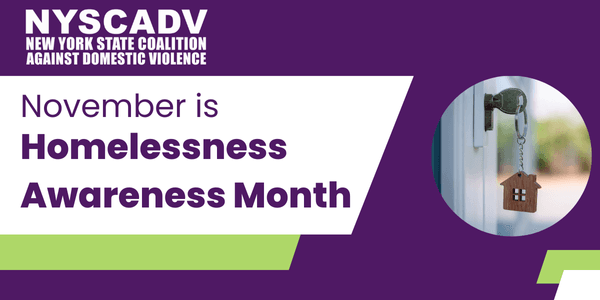
November is Homelessness Awareness Month, dedicated to raising awareness about the struggles and challenges faced by individuals experiencing homelessness. While homelessness and domestic violence may seem like distinct problems, understanding this connection is essential for creating practical and meaningful solutions. Homelessness is a pervasive issue that affects millions of people around the world. It can result from various complex factors, such as economic hardship, mental illness, substance use, or a lack of affordable housing. In the United States alone, approximately 580,466 people are unhoused on any given night, according to the 2020 Annual Homeless Assessment Report. Like domestic violence, homelessness does not discriminate and is not limited to any particular demographic; it can impact individuals and families across different backgrounds, races, and age groups.
The connection between homelessness and domestic violence is often overlooked, yet it is a critical aspect of both problems. Domestic violence, characterized by physical, emotional, or psychological abuse within an intimate relationship, can force victims to leave their homes, leading to homelessness in many cases. The abusive environment often leaves victims with little choice but to escape in search of safety and stability.
Survivors may experience homelessness due to:
- Forced Displacement: Victims of domestic violence may have no other option but to leave their homes to escape their abusers. They often become homeless because they have no alternative housing arrangements.
- Limited Resources: Homeless individuals are already struggling to meet their basic needs, and survivors of domestic violence may have even fewer resources at their disposal, making it more challenging to find safety.
- Vulnerability: Homeless individuals, including those fleeing domestic violence situations, are more vulnerable to physical and emotional harm. They often lack the security and support networks necessary to protect themselves from further abuse.
- Trauma: Survivors of domestic violence often carry the trauma of their experiences with them into homelessness, which can make the path to recovery and stability even more challenging.
Supporting Victims of Domestic Violence and Homelessness
Expanding options for unhoused domestic violence survivors:
- Increased Housing Options and Flexible Funding: Survivors need more types of housing beyond shelter settings. Flexible funding would allow domestic violence programs to work with survivors to locate safe, affordable, and more permanent housing options that suit their needs.
- Learn more about flexible funding and what it covers from partners at the National Alliance for Safe Housing (NASH.)
- New York State is currently piloting a flexible funding project. Learn more here.
- Legal Protection: Enforce and strengthen legal protections for victims of domestic violence. This includes restraining orders, legal aid, and advocacy for survivors in the justice system.
- Access to Services: Improved access to mental health services, addiction treatment, childcare and employment opportunities can empower survivors to regain independence and stability.
- Education and Awareness: Recognizing the intersection of homelessness and domestic violence is crucial. Communities, organizations, and individuals must work together to support those affected.
- Equal workplace policies: Victims of domestic violence have leave laws that protect employment if they need to take some leave time due to the abuse t. Educating victims about the work protections they have at work can allow them to remain employed.
- Promising programs can be found in NYSCADV's Primary Prevention Toolkit.
- Economic Justice: Poverty, loss of wages, and low economic status are often the reasons why victims of domestic violence are homeless. More programs that educate victims on economic empowerment can increase financial stability and prevent victims from becoming homeless.
- NYSCADV and many local domestic violence service provider organizations across New York State offer training programs and support for survivors. Click here to learn more about NYSCADV's Economic Empowerment Project.
- Housing rights: Victims of domestic violence have a legal right to housing. The Violence Against Women Act of 2005, also known as VAWA, protects victims from being discriminated against in public and subsidized housing.
Homeless Awareness Month offers an opportunity to acknowledge not only the issue of homelessness but also the complex challenges that intersect with it, such as domestic violence. By recognizing the connection between these two problems and working towards comprehensive solutions, we can create a more compassionate and supportive society where individuals affected can find safety, healing, and a path to a brighter future. Together, we can make a difference in the lives of those who need it most.


